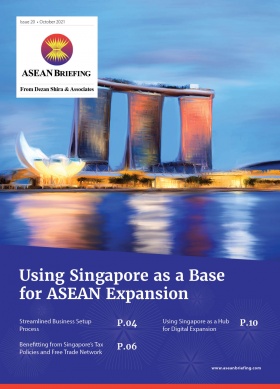Government Facilities for National Strategic Projects Under Indonesia’s Omnibus Law
Government Regulation 42 of 2021 (GR 42/2021) is an implementing regulation of Indonesia’s Omnibus Law that contains provisions on the types of facilities aimed to accelerate the implementation of national strategic projects throughout the country.
The facilities include land procurement by the government, easing of obtaining business, and the accelerated procurement of goods and services, among others.
National strategic projects are Indonesian infrastructure projects that have been categorized as vital to increasing Indonesia’s economic growth, improving community welfare, and increasing regional development. There are over 200 projects ranging from toll road development new airport construction to broadband enhancement coverage, worth close to US$500 billion.What facilities are provided for national strategic projects in Indonesia under the Omnibus Law?
Facilities for national strategic projects in Indonesia will be granted at different stages of the project’s lifecycle, under the Omnibus Law provisions, specifically – planning, preparation, transaction, construction, and operation and maintenance.
Planning stage
GR 42/2021 offers a number of facilities in relation to the planning of a national strategic project.
Acceleration of licensing and non-licensing matters
The Coordinating Minister for Economic Affairs or an appointed state-owned enterprise will expedite the business licensing process and non-licensing documents.
Spatial planning
The Ministry of Agrarian Affairs and Spatial Planning will proactively identify the land needed for the national strategic project to start.
Land procurement
The Ministry of Finance (MoF) can allocate funds for land acquisition based on a recommendation issued by the minister.
Environmental studies
The Ministry of Environment and Forestry (MEF) shall identify the need for required environmental studies to initiate the project.
Utilization of forest areas
In addition, the MEF will identify any requirements related to the utilization of forest areas in order to initiate the national strategic project.
Sectoral master plan
In the event a national strategic project has yet to be incorporated into the sectoral master plan, the minister or head of a state-owned agency is required to issue recommendations on the suitability of the project in relation to the sectoral master plan.
Planning for financing
National strategic projects can receive funding from regional or state budgets as well as entities formed through cooperation between private business and the government, also known as (Kerja Sama Pemerintah dan Badan Usaha – KPBU).
A KPBU entity can only fund the following types of national strategic projects:
- Provision of public service infrastructure;
- The optimization of state/regionally owned goods;
- The optimization of state-owned assets; and/or
- Boosting of state/regional revenue.
Preparation stage
In the preparation stage, the central or regional government must provide facilities ranging from feasibility studies, spatial planning, and the utilization of state-owned assets for the national strategic project.
Preparation facilities
The relevant minister, mayor, governor, or institution head must make preparations for the national strategic project encompassing the following elements:
- Feasibility studies;
- Spatial and zoning plans;
- Land procurement locations;
- Environmental studies; and
- Sources of funding.
Utilization of state-owned assets
If the assets of state-owned enterprises are used in the development of a national strategic project, then the funding for this should be limited to:
- The dismantling and transfer of assets of state-owned enterprises;
- Payment of rent; and
- Rehabilitation of assets owned by state-owned entities.
Transaction stage
The government may grant a guarantee for the implementation of the strategic project from which the financing is sourced from other legitimate financings.
However, the projects must be technically and financially feasible and the entities involved have adequate risk mitigation plans.
Construction stage
The minister, mayor, governor, or institution head will supervise control over the implementation of the construction stage of the national strategic project. The government will also prepare the security, sustainability, and health and safety standards for every construction project, in addition to issuing construction eligibility certificates to providers of construction services.
Operation and maintenance
The minister, mayor, governor, or institution head are obligated to prepare a plan for the operation and maintenance of the national strategic project.
Government officials can also cooperate with a business entity for the operation and maintenance of the project, taking into consideration the following elements:
- The financial capacity of the relevant region to operate or maintain the project;
- Opportunity for capacity building, development, or the optimization of the project; and
- The availability of operational and/or maintenance support.
Accelerate procurement of goods and services
GR 42/2021 also permits ministries and government agencies to accelerate the procurement of goods and services for the implementation of national strategic projects.
This facility is based on the following provisions:
- Direct procurement in relation to service consultations of up to 500 million rupiah (US$34,699);
- Direct appointments with any international financial institutions that are in cooperation with the government for the specific project; and
- Direct appointments of providers of goods/services providers of consultation services may be conducted twice, on the condition that said providers have already completed similar contracts with the government officials in question and performed reliably.
Further Reading
- Indonesia’s New Provisions for the Construction Sector Under Omnibus Law
- Indonesia’s Omnibus Law: New Protection and Empowerment Measures for Small Businesses
- New Provisions for Indonesia’s Postal, Telecommunications, and Broadcasting Sectors Under the Omnibus Law
About Us
ASEAN Briefing is produced by Dezan Shira & Associates. The firm assists foreign investors throughout Asia and maintains offices throughout ASEAN, including in Singapore, Hanoi, Ho Chi Minh City, and Da Nang in Vietnam, Munich, and Esen in Germany, Boston, and Salt Lake City in the United States, Milan, Conegliano, and Udine in Italy, in addition to Jakarta, and Batam in Indonesia. We also have partner firms in Malaysia, Bangladesh, the Philippines, and Thailand as well as our practices in China and India. Please contact us at asia@dezshira.com or visit our website at www.dezshira.com.








